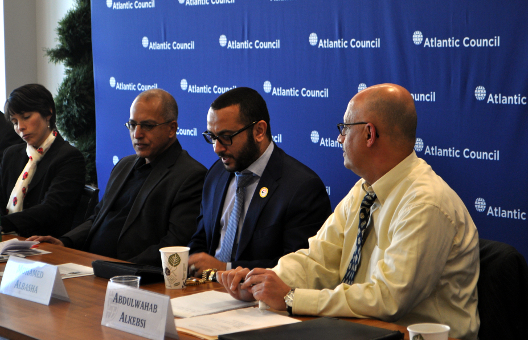 Just prior to the official conclusion of Yemen’s National Dialogue, the Rafik Hariri Center for the Middle East hosted a roundtable discussing the culmination of Yemen’s National Dialogue Conference (NDC) and what challenges the country continues to face as it moves forward into the next phase of its transition. The roundtable, held on January 24, 2014, featured analyst Abdul-Ghani al-Iryani of the Khobara Center, and Mohammed Albasha, spokesman at the Embassy of the Republic of Yemen, and was moderated by Abdulwahab Alkebsi of the Center for International Private Enterprise.
Just prior to the official conclusion of Yemen’s National Dialogue, the Rafik Hariri Center for the Middle East hosted a roundtable discussing the culmination of Yemen’s National Dialogue Conference (NDC) and what challenges the country continues to face as it moves forward into the next phase of its transition. The roundtable, held on January 24, 2014, featured analyst Abdul-Ghani al-Iryani of the Khobara Center, and Mohammed Albasha, spokesman at the Embassy of the Republic of Yemen, and was moderated by Abdulwahab Alkebsi of the Center for International Private Enterprise.
The panelists described the framework (set forth in the National Dialogue’s final report) for the next steps in the political process—the formation of a constitutional committee, the drafting of a constitution followed by a referendum, and finally elections—but the focus of the talk centered on managing the political and social hurdles that Yemen will have to deal with in order to continue successfully along the path to transition. It was noted that though the results of the NDC are still somewhat uncertain and have yet to be implemented, it provided an important forum for aggrieved parties to sit at the same table and focus on Yemen’s future. The panelists emphasized that a key difficulty facing Yemen is the resolution of the country’s southern issue. Though the NDC agreed on fundamentally reshaping governance and introducing a federal system, there still remains a critical deficit of confidence that will have to be bridged to maintain a unified Yemen and keep southerners included and interested in the political process. Participants in the roundtable raised other issues that still need to be resolved, such as the number of states in Yemen’s new proposed federal system, continued discrimination against Southerners, Houthi buy-in to the process, and the larger looming issue of humanitarian and economic challenges.
Recognizing a dearth of policy-oriented dialogue on Yemen in Washington, the Hariri Center for the Middle East at the Atlantic Council and the Project on Middle East Democracy launched the Yemen Policy Initiative to provide a platform for dialogue and opportunities for advocacy to advance a more coherent and comprehensive US policy toward Yemen.
